 As you read this, billions of social conversations are happening online. New content is constantly being published on social media networks, news media, and blogs, and some of that information is related to topics that interest you.
As you read this, billions of social conversations are happening online. New content is constantly being published on social media networks, news media, and blogs, and some of that information is related to topics that interest you.
Is there a free and simple way to know what is happening in your industry or niche so that you are not wasting a huge amount of time doing research? Yes, there is. It’s called …
Google Alerts
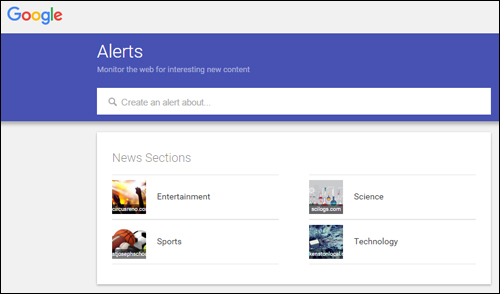
(Google Alerts – free web monitoring service)
Google Alerts is simple, useful and free tool from Google that lets you keep up with news and information about all kinds of topics, stay informed about people, brands and companies, and track what is being written online about you and your business.
Google Alerts is not only great for managing your reputation online, but also for sourcing information about people, brands, companies, and any other topic you need to know about.
With Google Alerts, you subscribe to a keyword or topic and you’re done. Whenever Google’s robots crawl a new web page, blog post, news update, press release, a video, tweet, or any other content related to that topic, you will automatically receive an email or RSS update.
How To Set Up A Google Alert
Let’s go over the simple steps required to start using Google Alerts:
Step 1 – Log Into Your Google Account
If you don’t have a Google account, create one. Google lets you access loads of free services with just one username and password. If you use Gmail, post videos to YouTube, run an Adwords campaign or have a GooglePlus page, then you should already have a Google account.
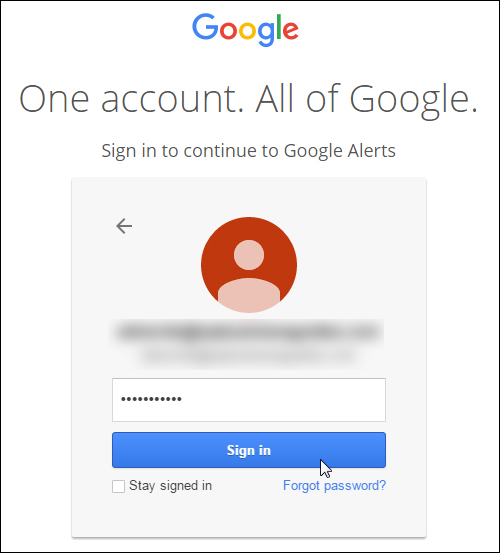
(Log into your Google Account to set up your alerts)
![]()
You can still set up Google Alerts without accessing your Google Account, but this will give you fewer configuration options (e.g. you can’t receive Google Alerts via RSS, only email).
Once you have logged into your Google Account, access the Google Alerts tool here:
Step 2 – Set Up Your Alerts
You can set up alerts for every topic, business, person or web address you want to track. You can keep track of brands, employees, celebrities, investors, competitors, influencers, etc. There is no limit to how many alerts you can set up.
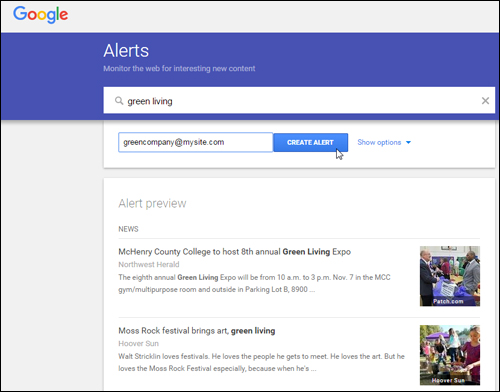
(Set up as many alerts as you like with Google Alerts)
Step 3 – Set Up Your Preferences & Save
Google Alerts lets you specify the keyword(s) you want alerts for, how often alerts should be sent (as it happens, once a day, once a week), sources (e.g. automatic, news, blogs, web, videos, discussions, etc.), language, region, how many (all results, only the best results), and how to receive alerts (via email or RSS feed) …
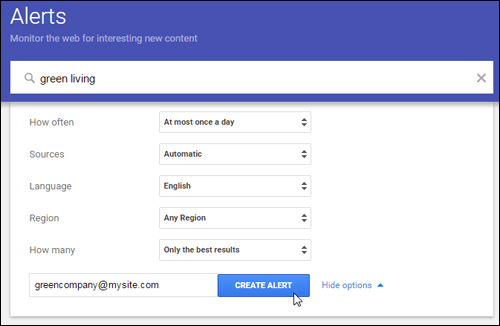
(Google alert preferences)
If you want to narrow the source of your alerts, select the source from the drop-down menu …
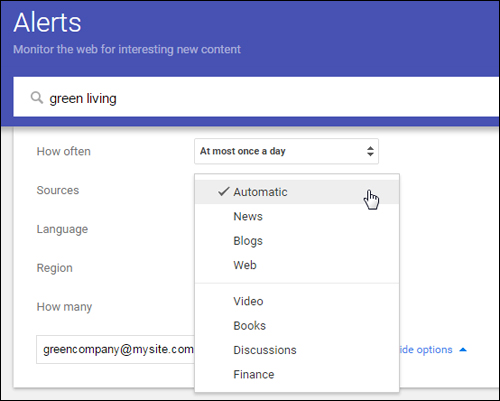
(Google alert sources)
You can also specify alert delivery times in your settings, and whether these should be sent in a single email …
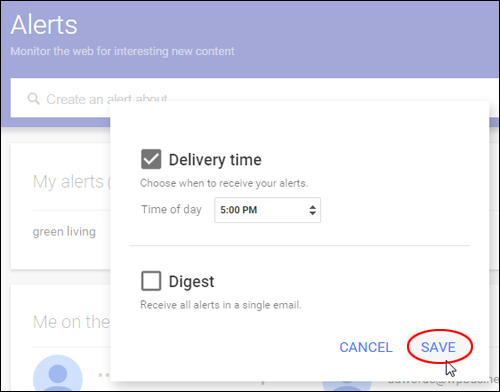
(Google alert settings)
All of these settings can be changed anytime.
You will begin receiving alerts as per your preferences …
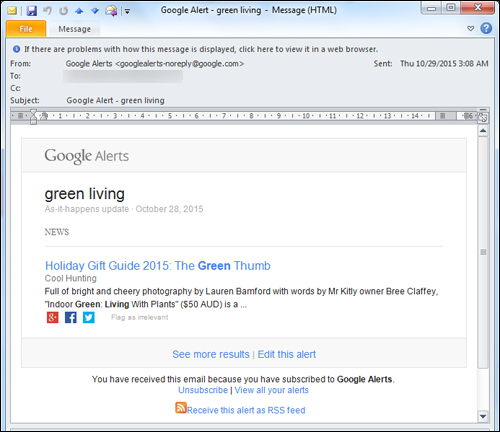
(Receive alerts via email or RSS)
Note that at the bottom of your email notification, you are given various options, including:
- See more results
- Edit the alert
- Unsubscribe (stop receiving the alert)
- View all your alerts
- Receive the alert as RSS feed
How To Set Up Google Alerts While Searching On Google News
You can easily set up Google Alerts while browsing the web. Here’s how:
Go to Google News and type in your search term …
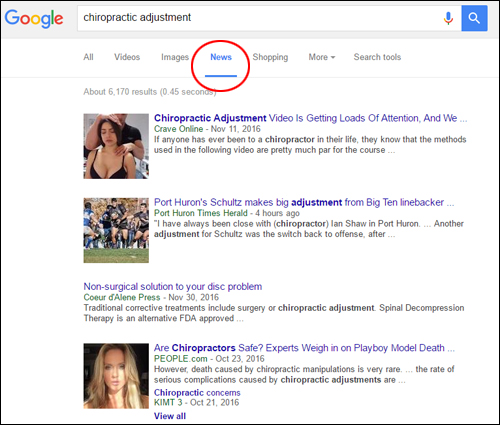
(Enter a search term in Google News)
Scroll down to the bottom of the page and click on ‘Create Alert’ …
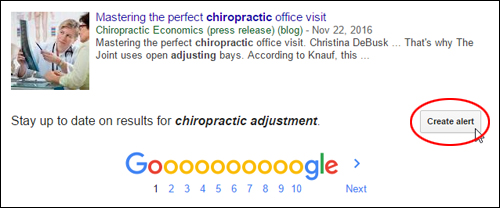
(Google News – Create Alert)
Enter your email address and click on the ‘Create Alert’ button …
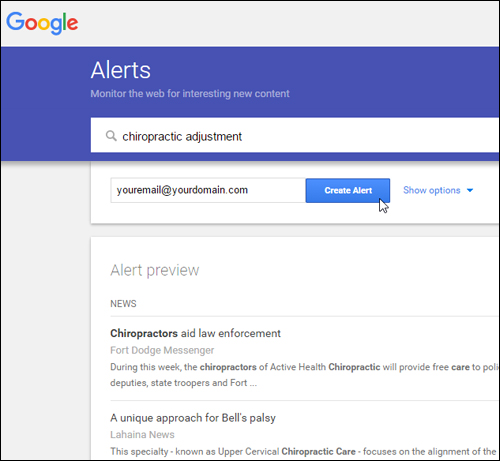
(Google Alerts screen)
If you elect to receive alerts via email, you will be asked to verify your Google Alert request …
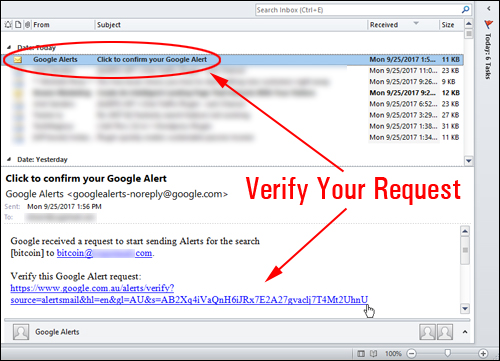
(Verify your Google Alert request)
After confirming your request, your Google Alert will be set up and you will begin to receive alert notifications via email.
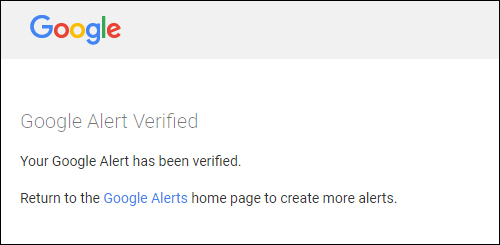
(Your Google Alert has been successfully verified)
You can return to the Google Alerts home page and create as many alerts as you want.
Deleting Google Alerts
You can stop receiving alerts by deleting them from your account …
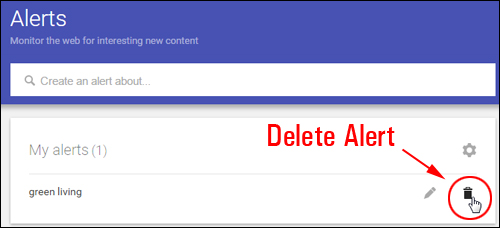
(Google alert settings)
You can also stop receiving alerts by clicking on the ‘Unsubscribe’ link at the bottom of your emails …
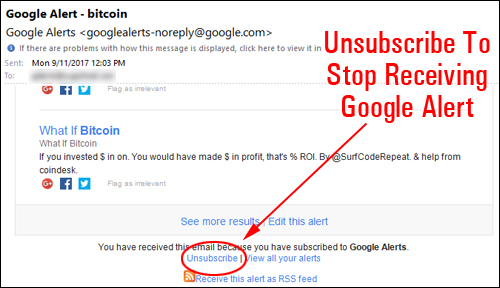
(Click the Unsubscribe link at the bottom of the email)
Confirm that you want to unsubscribe from your Google Alert …
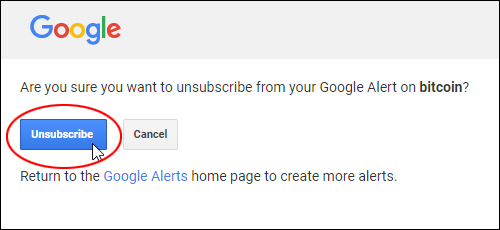
(Click unsubscribe to stop receiving Google Alerts)
Your Google Alert will be cancelled …
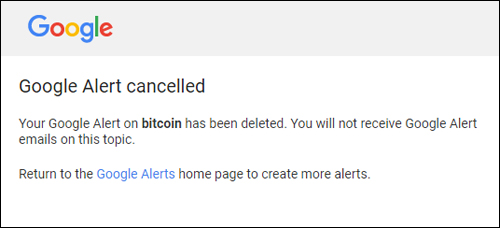
(Google Alert cancelled)
You will no longer receive alert emails on the topic from Google after unsubscribing.
![]()
If you choose to receive alerts sent to your inbox via email, you can configure rules in your email program to redirect alerts automatically to one or more folders. This will help to keep your alerts organized and easier to track and sort through.
If your alerts are sent out via RSS feed, you can use a feed reader to view the information on your smart phone or mobile device.
Once you have set up alerts, you can monitor information about topics, brands, the competition, etc., or create content for your blog in your niche/industry.
How To Publish News Items From Google Alerts On Your WordPress Site
You can repost news items directly from Google Alerts on your WordPress your WordPress blog as blog posts or as a ‘widgetized’ item on your sidebar.
Let’s take a look at both methods:
Publish Google Alerts News Items As A Blog Post
To display news items from Google Alerts as a blog post, do the following:
Set up your site to post by email …
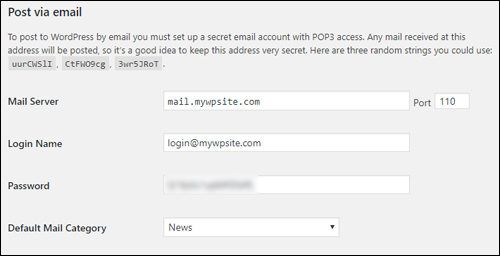
(Post to WordPress by email)
If you need help with this step, see this tutorial:
Next, create an Alert to send to the email address you have set up …
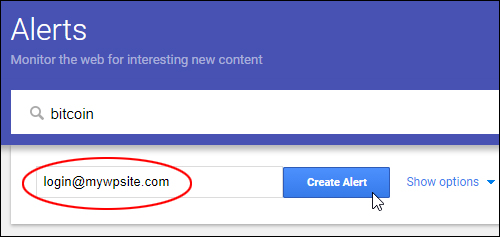
(Create Alert and send to email)
Alerts will now be posted to your site, or come in as ‘drafts’ that you can review and publish.
Publish Google Alerts News Items On Your Sidebar
To display news items from Google Alerts as a as a ‘widgetized’ item on your sidebar, all you need to do is set up to receive your alerts as an RSS feed as described earlier …
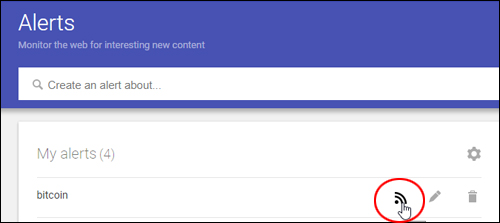
(Receive alerts as an RSS feed)
Next, copy the RSS feed link to your clipboard …
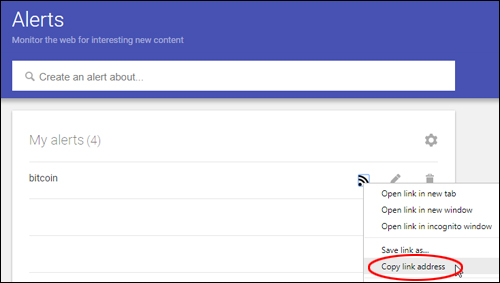
(Copy RSS link address)
And add the RSS feed to an RSS widget as described in this tutorial:
Your alert will display as a ‘widgetized’ item on your sidebar and the feed will update regularly as Google sources new items …

(RSS Widget with Google Alert feed)
Hopefully, this tutorial has been useful. If you would like to know more about using social media management tools to improve user engagement, see this article: Great Social Media Measurement Resources Every WordPress User Should Know About

***
"I love the way your email series "Infinite Web Content Creation Training Series" is documented and presented. It is very absorbing and captivating. The links and tutorials are interesting and educational. This has motivated me to rewrite my content following the concepts I am learning from the email series." - Mani Raju, www.fortuneinewaste.com
***

